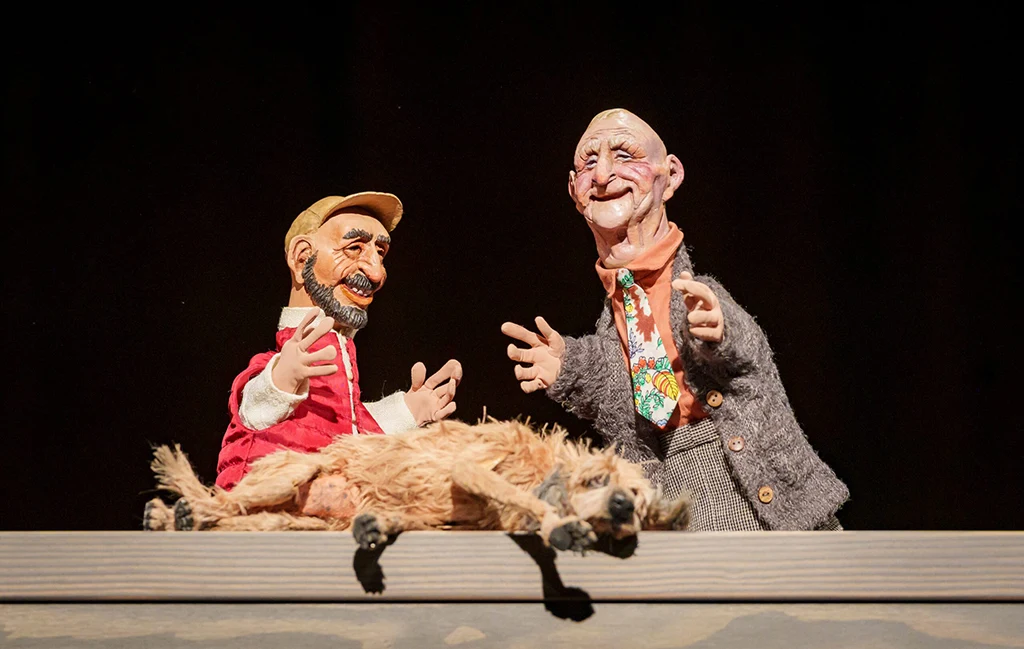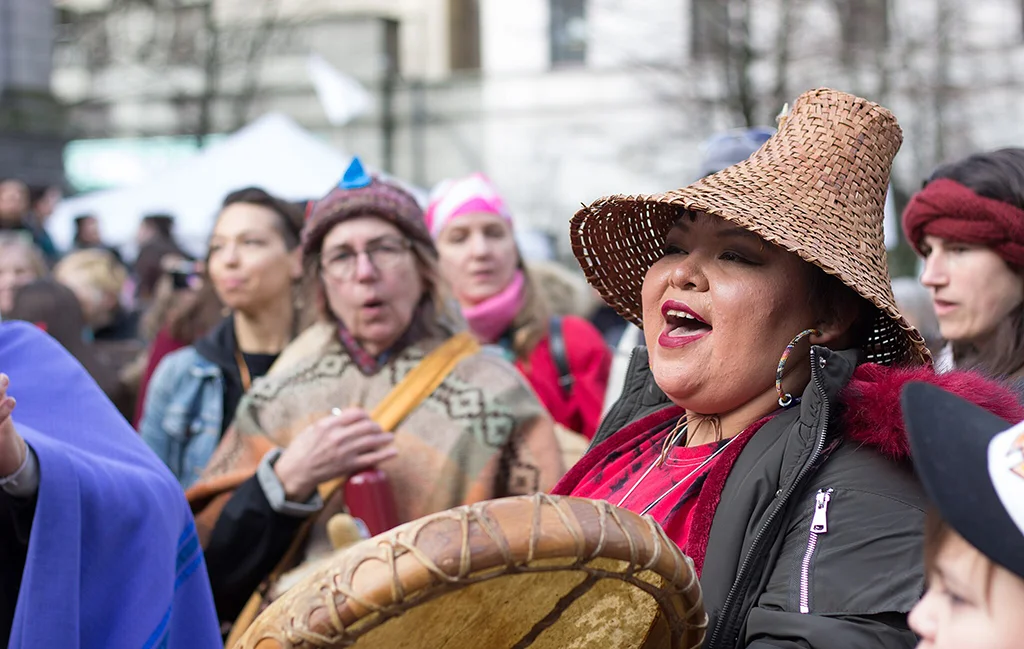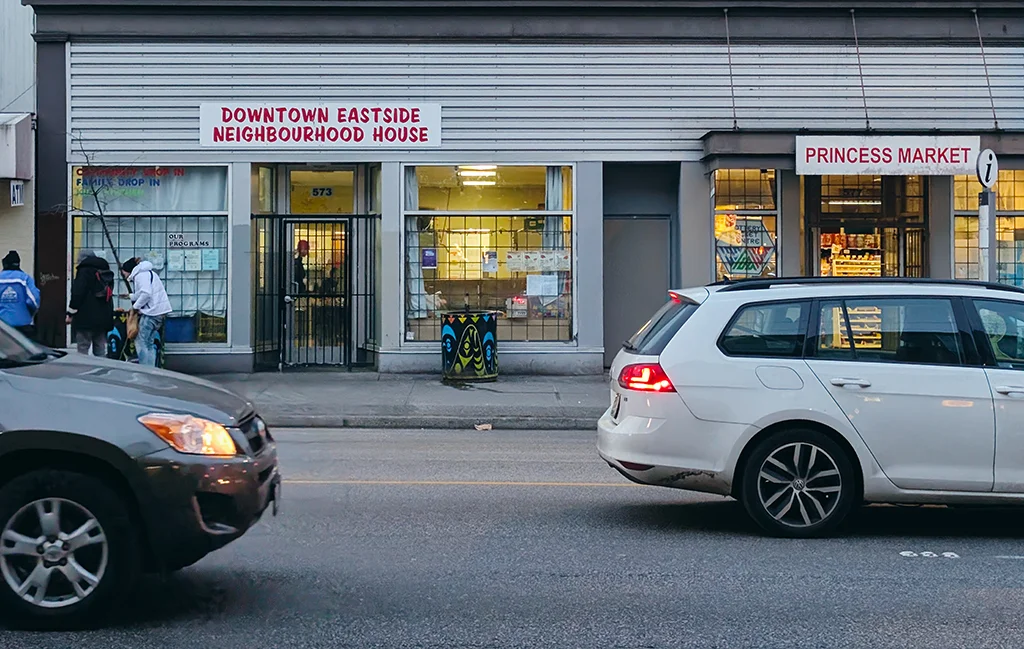A few blocks from Commercial Drive, where storefronts have slowly shifted from long-standing family businesses to sleek cafés and boutique shops, Ronnie Burkett’s Wonderful Joe plays at the Historic Theatre until February 23, 2025. Audiences entering the intimate venue are greeted not only by the promise of masterful puppetry but by a story that feels rooted in the shifting streets outside its doors.
Burkett, a Governor General’s Award-winning puppeteer, is revered as one of Canada’s foremost theatre artists. Known internationally for his distinctive marionette work, Burkett’s productions often blur the boundary between whimsy and social realism. With Wonderful Joe, Burkett returns to The Cultch, a familiar stage for his work, bringing a story that resonates with the changing landscape of East Vancouver—a tale of displacement, adaptation, and the quiet struggle to hold onto a sense of place.
While the play’s setting echoes local realities, Wonderful Joe does not function as overt commentary. Its strength lies in its subtlety. Gentrification lurks in the background, but the story belongs to its characters—a man and his dog—grappling not with policy but with the daily erosion of what they once called home. This understated approach challenges the common expectation that theatre engaging with social issues must be didactic. Instead, Burkett allows the audience to interpret the narrative’s proximity to their own lives, offering an experience that is personal rather than prescriptive.
Theatre That Speaks to a Changing Vancouver
At the heart of Wonderful Joe is a simple premise: a man and his dog, Mister, navigate a world that is slipping away from them. Joe’s neighbourhood is changing, but the shift is presented through lived moments rather than grand statements. The butcher, once a fixture of the block, packs up for the suburbs. A trans sex worker holds on to her place in the community, while an Indigenous mother raises her child amid mounting uncertainty. A real estate agent hovers, representing a force felt more than spoken about. These characters, threaded together by Joe’s daily life, reflect the quiet erosion of a community as familiar spaces vanish.
Burkett’s marionettes, handcrafted with his signature attention to detail, imbue each figure with individuality. Their expressions are finely tuned—not caricatures but fully realized characters whose movements convey humour, vulnerability, and defiance. The craftsmanship serves the story, avoiding spectacle for its own sake. Joe’s weariness as he pulls Mister’s leash or the butcher’s hesitation as he boards up his shop are gestures that carry weight. The string work vanishes into the background, allowing the audience to see people, not puppets.
The play’s success lies in Burkett’s refusal to reduce his characters to symbols. The sex worker is not a commentary on marginalization, nor is the real estate agent an embodiment of unchecked development. Each person is presented as they are—individuals adapting to changes beyond their control. This nuance pushes back against the assumption that theatre exploring urban displacement must be overtly critical. Instead, Burkett offers a reminder that change, while often viewed as progress, is felt most deeply in the everyday routines it disrupts.
Ronnie Burkett’s Enduring Craft
Ronnie Burkett’s name holds weight in Canadian theatre. Over a career spanning more than four decades, he has elevated puppetry from a form often confined to children’s entertainment into work regarded as serious, adult theatre. Burkett’s productions are sought after internationally, yet his connection to local audiences remains distinct. His return to Vancouver with Wonderful Joe is not merely another entry in a celebrated career—it reflects his ongoing dialogue with Canadian urban life, particularly communities undergoing change.
Burkett’s ascent began in the 1980s when he founded the Theatre of Marionettes. Early works like Fool’s Edge and Tinka’s New Dress received critical acclaim, establishing his reputation as a master craftsman and a playwright capable of weaving intimate human stories through stringed figures. His recognition culminated in the Governor General’s Performing Arts Award and the Siminovitch Prize, two of the country’s highest artistic honours. Yet these accolades have not removed him from the spaces he portrays. Burkett’s productions frequently occupy small theatres, allowing him to maintain a rare level of control—each marionette is designed, carved, and animated by his hand.
This commitment to precision carries into his performance style. Unlike traditional puppeteers who might operate unseen, Burkett performs visibly, interacting directly with the audience while manipulating his characters. This choice erodes the separation between actor and puppet, challenging the assumption that marionette work requires suspension of disbelief. Instead, Burkett invites viewers to acknowledge the strings while investing emotionally in the figures they animate. This tension—between artifice and authenticity—positions Burkett not simply as a puppeteer but as one of Canada’s most distinctive theatrical voices.
Resonance Without Preaching
Wonderful Joe unfolds in a place undergoing the kind of change familiar to many in Vancouver. Though the word gentrification is never spoken on stage, the play’s setting—a neighbourhood where residents are displaced and storefronts give way to development—mirrors what has happened throughout the city’s East Side. It is this backdrop, presented without overt judgment, that has led some audience members to view the production as a reflection of their own experiences.
However, assuming that Burkett intended to critique gentrification risks narrowing the scope of the work. The play is not a commentary on property markets or zoning laws but about a man losing his home and the community fraying around him. Those seeking a statement on urban inequality may be left unsatisfied. Yet others might argue that Wonderful Joe succeeds precisely because it resists reducing displacement to policy failure. Instead, it captures the personal consequences—the butcher leaving not because of an abstract housing crisis but because his rent is no longer viable. The real estate agent is not cast as a villain but simply another person working within a system.
This ambiguity challenges the assumption that theatre addressing social change must deliver conclusions. Burkett offers no answers, only the lived reality of characters caught in transition. Some viewers may interpret this restraint as avoiding harder truths, while others will see it as a strength—theatre not as a solution but as a witness. Wonderful Joe leans into observation in a cultural landscape, often demanding declarations, leaving audiences to draw their own lines between art and the city around them.
Why Wonderful Joe Matters Now – And Why You Should See It
As Wonderful Joe enters its final stretch at the Historic Theatre, the significance of its staging feels particularly pointed. Vancouver’s East Side continues to shift, evolving into something increasingly unrecognizable to those who called it home a decade ago. Burkett’s work meets this reality without framing it as crisis or triumph. Instead, it offers an account of what change feels like for those standing still while everything around them moves.
For audiences, this is theatre that acknowledges displacement without demanding allegiance to a cause. Some may view that as restraint, others as a missed opportunity. Either way, it reflects a creative choice—Burkett’s refusal to reduce his characters to symbols or his audience to spectators seeking instruction. This approach holds particular value now as conversations about housing in Vancouver grow increasingly polarised. Wonderful Joe stands apart by granting dignity to those left behind without suggesting their stories are over.
With performances running until February 23, Wonderful Joe offers a rare chance to see one of Canada’s leading theatremakers working at the height of his craft. Burkett’s work is meticulous, but his stage is far from sterile. The strings are visible, the characters imperfect, and the humour often unexpected. For those seeking more than commentary—for those drawn to the particular beauty of theatre as an art form driven by human touch—this production remains one not to miss.
Dates, Venue, and Tickets
Wonderful Joe runs until February 23, 2025, at the Historic Theatre, 1895 Venables Street.
Tickets are available through The Cultch’s website or by phone at 604-251-1363.
Performances have limited seating, and most dates are nearing capacity, so early booking is recommended.
Teresa is a dedicated storyteller rooted in the Downtown Eastside, reporting on local art, cultural events, and community initiatives. Her work highlights the creativity and resilience of the neighbourhood, amplifying voices that often go unheard. Believing in the power of art to connect and inspire, Teresa focuses on the people and projects that shape the vibrant DTES community.





Leave a Comment